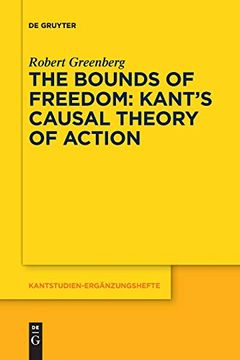Share
The Bounds of FreedomkantS Casual Theory of Action (Kantstudien-Ergänzungshefte) (in English)
Robert Greenberg (Author)
·
De Gruyter
· Paperback
The Bounds of FreedomkantS Casual Theory of Action (Kantstudien-Ergänzungshefte) (in English) - Robert Greenberg
$ 22.39
$ 27.99
You save: $ 5.60
Choose the list to add your product or create one New List
✓ Product added successfully to the Wishlist.
Go to My WishlistsIt will be shipped from our warehouse between
Friday, June 28 and
Monday, July 01.
You will receive it anywhere in United States between 1 and 3 business days after shipment.
Synopsis "The Bounds of FreedomkantS Casual Theory of Action (Kantstudien-Ergänzungshefte) (in English)"
This monograph is a new interpretation of Kant's àtemporal conception of the causality of the freedom of the will. The interpretation is based on an analysis of Kant's primary conception of an action, viz., as a causal consequence of the will. The analysis in turn is based on H. P. Grice's causal theory of perception and on P. F. Strawson's modification of the theory. The monograph rejects the customary assumption that Kant's maxim of an action is a causal determination of the action. It assumes instead that the maxim is definitive of the action, and since its main thesis is that an action for Kant is to be primarily understood as an effect of the will, it concludes that the maxim of an action can only be its logical determination. Kant's àtemporal conception of the causality of free will is confronted not only by contemporary philosophical conceptions of causality, but by Kant's own complementary theory of causality, in the Second Analogy of Experience. According to this latter conception, causality is a natural relation among physical and psychological objects, and is therefore a temporal relation among them. Faced with this conflict, Kant scholars like Allen W. Wood either reject Kant's àtemporal conception of causality or like Henry E. Allison accept it, but only in an anodyne form. Both camps, however, make the aforementioned assumption that Kant's maxim of an action is a causal determination of the action. The monograph, rejecting the assumption, belongs to neither camp.
- 0% (0)
- 0% (0)
- 0% (0)
- 0% (0)
- 0% (0)
All books in our catalog are Original.
The book is written in English.
The binding of this edition is Paperback.
✓ Producto agregado correctamente al carro, Ir a Pagar.

